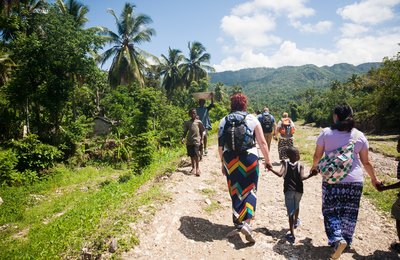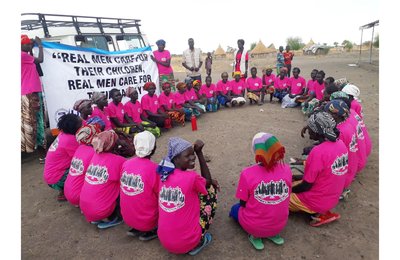
Promoting dialogue, mediation, and negotiation
Initially work in the field of dialogue, mediation and negotiation was limited to Kathmandu, Nepal's capital city, where impact of conflict was minimal. Gradually some organisations began to reach outside of Kathmandu.
After conducting research on the "cost of war" and organising workshops and training on conflict resolution and peacebuilding in Kathmandu, the National Peace Campaign (NPC) began work in three conflict-prone districts - Rolpa, Salyan and Jajarkot. Rolpa was particularly notable as one of the districts where the conflict firstly began.
Participants in the programmes appreciated process and contents of the training and began to distribute what they had learnt and the training they had received. Indeed, NPC developed a training manual on conflict resolution and peacebuilding almost ten years ago and distributed it to the training participants and more widely. By working in active conflict areas, NPC gained much respect for their work.
For the last 12 years, NPC has worked resolutely to develop capacity for peaceful conflict resolution through workshops, trainings, research, and engaging in dialogue and negotiation.
Many organisations began to incorporate conflict resolution into existing programmes or develop new initiatives to address the varied impact of conflict and advocate solving the conflict through mediation and negotiation.
Supporting the ongoing peace process
After cease-fire and Comprehensive Peace Accord (CPA) in 2006 many organisations rapidly began working in the different sectors of conflict resolution.
One example is Creative International Forum (CIF) which is mediating community-level conflicts through its training participants and its informal partners. CIF has conducted regional and district level trainings on conflict resolution, peacebuilding and human rights in 30 districts in the low land of Terai and the eastern hills - an area believed to be in danger of erupting into ethnic violence.
CIF has claimed that around 100 local conflicts and disputes were solved by mediation and that a culture of mediation has been cultivated. CIF believes that regular intervention for mediation is needed to promote and strengthen this in the long term.
CIF actively collaborates with civil society and political leaders in joint efforts for resolving conflict by dialogue, mediation and negotiation, and supporting for ongoing peace process. Around 800 members from all sectors in 30 districts have been involved.
A voice for conflict victims
Informal Sector Service Center (INSEC), a leading human rights organization has been constantly working on the agendas of the conflict victims including the victims of the massive human rights violations occurred during conflict. INSEC published the Conflict Victims' Profile (pdf, Nepalese) showing the total numbers of people killed, injured/handicapped and disappeared during the conflict.
All together 13,236 were killed, 1006 disappeared and 785 seriously injured or handicapped. The profile indeed allows people to find the victims' according to political affiliation, caste, sex, occupation, marital status, language, education and district. Unless and until the grievances of the victims would not be addressed the conflict resolution and peace process remain incomplete.
Hatred, grievances and pain remain in the Nepalese society without mechanisms to address them in post-conflict reconstruction. Indeed, many conflict victims have been left out from the mainstream conflict resolution and peace process of Nepal. Not only are direct victims of the conflict are living with hatred, grievance and pain, but their families and children are also suffering. The children who were very young when their parents' were victimized by conflict have entered into youth alone with hatred and grievances.
To address issues such as these, organisation like Youth Initiative are working with young people to empower, strengthen, promote and practice peaceful means of solving differences, civic engagement, democratization and developing collaborative efforts. These interventions cultivate a culture of peaceful conflict resolution through dialogue, mediation, negotiation where possibility of the violent conflict would minimal.
This article has touched upon the work just a four of the many peacebuilding organisations actively building peace in Nepal. For more, visit Insight on Conflict's directory of peacebuilding organisations in Nepal.










